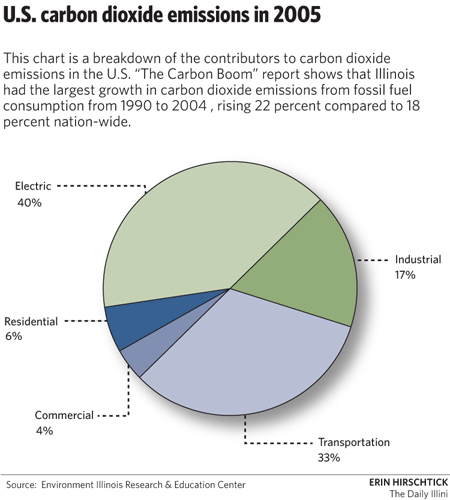Report reveals steep CO2 increase in Illinois

Erin Hirschtick
April 13, 2007
“The Carbon Boom,” a report revealing a significant increase in carbon dioxide emissions from fossil fuel consumption, was released Thursday by Environment Illinois, a statewide environmental advocacy organization.
“Global warming pollution is skyrocketing here in Illinois, just as scientists are sounding alarms that we need to tackle emission levels to protect future generations,” said David Kanof, a field organizer for Environment Illinois. “This report is a wake-up call that we need to act now before it’s too late.”
Donald Wuebbles, director of the School of Earth, Society and the Environment at the University, said changes to our climate include increases in average temperatures, substantial melting of Arctic and Greenland ice and a decrease in size of more than 98 percent of glaciers in the world. Human activity very likely caused the changes in climate, he said.
Kanof said the Intergovernmental Panel on Climate Change, which looks at scientific data on global warming, released a report last week cautioning that the increase in emissions levels would lead to more droughts, floods, heat waves and other problems if left alone.
The U.S. Department of Energy collected the data that went into “The Carbon Boom.” The report is the first time the 2004 data has been released.
Get The Daily Illini in your inbox!
Kanof said the report found that Illinois’ carbon dioxide emissions from fossil fuel consumption rose by 41.9 million metric tons between 1990 and 2004, a 22 percent increase. Nationwide, carbon emissions rose 18 percent during that time, he said.
The report shows that the largest contributors to the increase in emissions are coal-fired power plants and transportation. Kanof said that in Illinois, carbon dioxide emissions from coal-fired power plants increased by 64 percent between 1990 and 2004. Illinois had the largest increase in emissions from these plants in the nation.
“Given the risks from global warming, this data documents an alarming trend in and a real need for federal and state leadership to solve this problem,” Kanof said. “To head off the worst impacts of global warming, we need to stabilize and reduce emissions by 2050.”
Angus Rockett, professor in the Department of Materials Science and Engineering, said Illinois should implement laws focusing on increasing energy efficiency, using carbon-free energy sources and mandating that renewable sources generated in Illinois provide a significant amount of the state’s power.
“Renewable energy is available today but can be greatly improved with further research,” Rockett said. “It is abundant in Illinois, it’s carbon-free, it brings high quality manufacturing, installation and maintenance jobs on the largest industries in Illinois.”
Joseph Teng, president of Students for Environmental Concerns and senior in ACES, said it is important to educate the public about global warming. He said the organization passed a five dollar sustainability fee for students to pay each semester. The money goes to integrating sustainability in all academic departments.
“I would like to be able to focus really on educating the public so we spend less time trying to convince everyone on this negative aspect of global warming,” Teng said.






